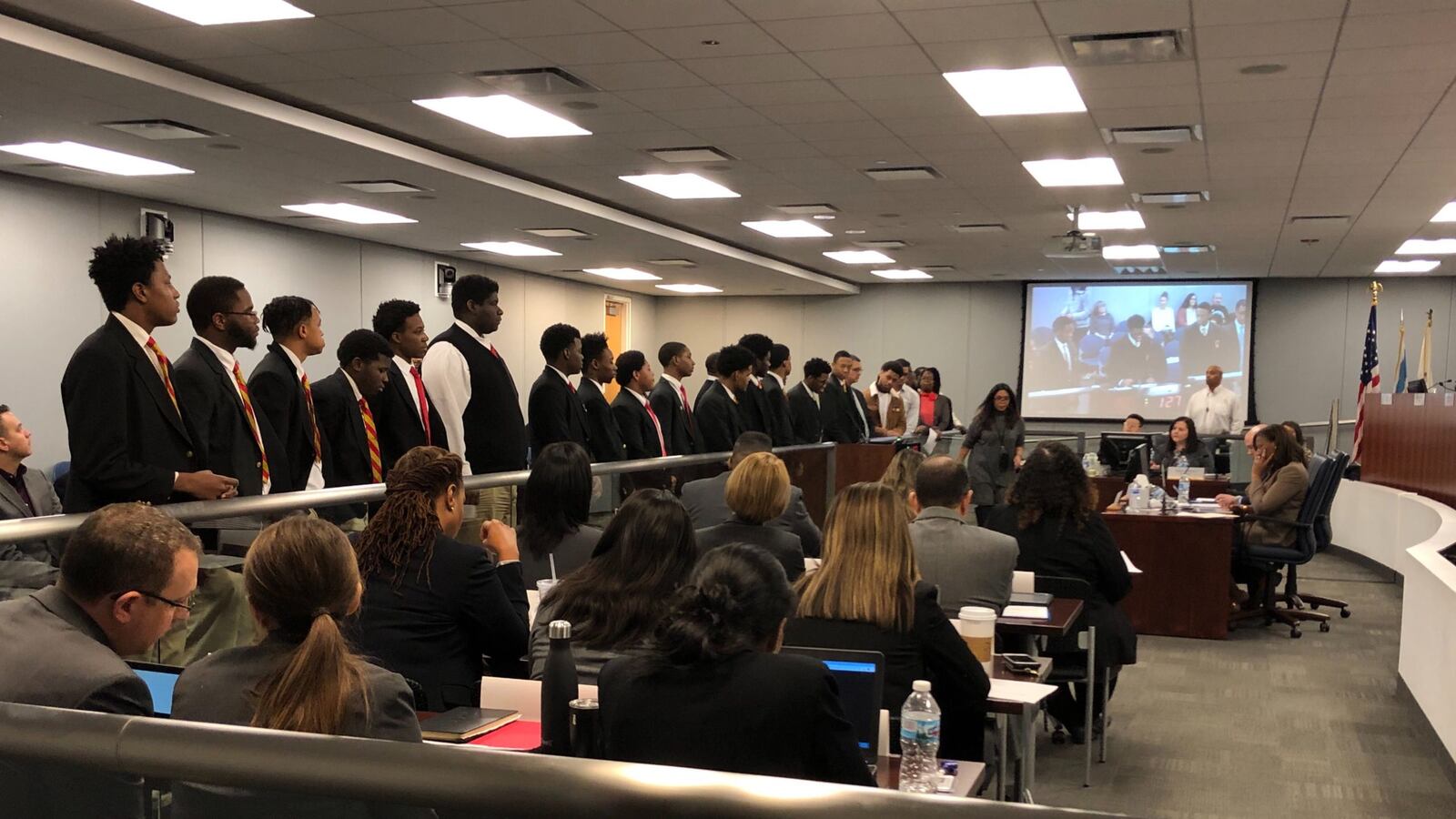The dozen or so Urban Prep students who crowded into a Chicago Board of Education meeting to pay testament to their school on Wednesday afternoon left with good news: The board renewed the contract for the Bronzeville campus for three years.
But two other campuses of the celebrated charter network — which was founded in 2002 with an empowering mission to send 100% of its all-male and all-black student body to college — are faltering. And it appears that the school board will be putting charters in the city under closer scrutiny.
Including the Urban Prep campus, the board on Wednesday approved all the 33 charter schools up for renewal. In contrast with its predecessor, the new board asked questions — some pointed — about performance and enrollment. It also attached conditions to each school’s new contract, and shortened the term for some.
Many of the schools, such as Erie Elementary and Legacy Charter School, are doing well in the district’s performance ratings.
Others continue to flounder. Board members raised concerns about a lack of financial transparency, poor support for special education students and English language learners, and high rates of suspension in kindergarten to second grade at some schools.
Twenty of the schools are under the umbrella of Youth Connection Charter Schools, which offers a second chance to students pushed out of traditional schools. Others, like Providence Englewood Charter School, are small single-site elementary charters.
Charter schools are publicly funded but independently run schools.
Board member Dwayne Truss, a longtime education activist on the West Side, said he was concerned that charter and alternative schools not meeting high educational standards were allowed to operate in communities of color.
“I really want to make sure that schools are trying to really be restorative,” Truss said, “not participating in establishing these obstacles” that communities already face.
On Wednesday, board members said they wanted year-round accountability for schools that just weren’t doing well enough.
“I don’t want CPS to be a punitive institution but there has to be accountability on how to address the issue detailed in their larger reports,” board member Luisiana Melendez said, referring to the documentation charters must submit when applying for a renewal of their contract.
Hal Woods, executive director of CPS’ office of innovation and incubation, acknowledged board members’ concerns and said the district is keeping a close eye on high suspension rates and financial mismanagement.
Woods said the district was considering launching a new charter transparency website that would include financial documents, details about the conditions of charter contracts, and possibly even a scorecard system about school quality.
If these scorecards materialize, the Urban Prep campuses could look significantly different.
The Bronzeville school, which received a conditional three-year extension, is going strong with 289 students and a college-going rate of 75% for its class of 2018. The district rates the school a Level 1.
Urban Prep’s Englewood campus, with 225 students and a Level 2 rating, last year landed on a warning list for schools the district could recommend for closure for poor performance. Any school that spends two years on the warning list faces closure. Its class of 2018 had a 71% college enrollment rate.
A year ago the district tried to close Urban Prep’s third campus, Urban Prep West. But the school appealed to the state charter commission, which agreed to authorize the school. Since then, Urban Prep West has struggled, with enrollment dropping 40% from the first to the second quarter of this school year, down from 156 to 94 students.
Dennis Lacewell, chief academic officer at Urban Prep, acknowledged that not all the network’s schools were doing equally well. But he said that judging schools by their school quality rating, and comparing them with other schools with different student populations, was unfair.
Urban Prep was doing well for black male students compared with their achievement in the district at large, he said. “You have to compare apples to apples. The district has hundreds of schools working with different groups of students,” Lacewell said. “You can’t put them all under the same blanket and evaluate them.”
Lacewell also blamed district-related difficulties that affected school performance.
Faulty data collection lowered the school rating of the Englewood campus, he said, when the district switched to the Aspen portal for student data in the middle of the year.
With the school’s future secured, Lacewell expects Urban Prep West enrollment to rise. Our presence is known,” he said. Recruiting more students “won’t be an issue at all.”
Here are the schools that received extensions on their contracts with Chicago Public Schools, including Youth Connection Charter Schools, Instituto Justice and Leadership Academy, and others:

